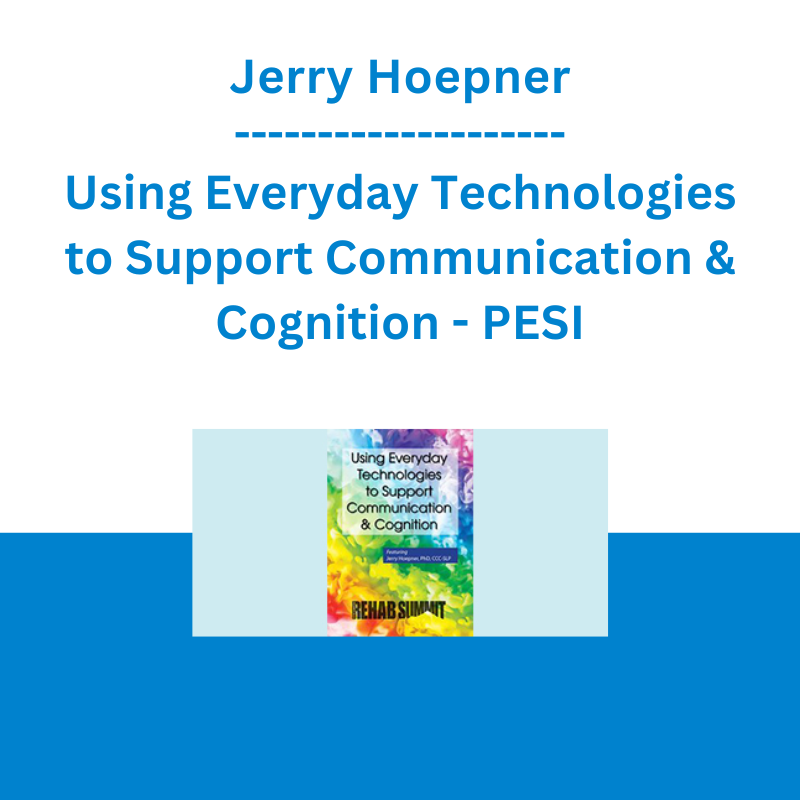*** Proof of Product ***
Exploring the Essential Features of “Jerry Hoepner – Using Everyday Technologies to Support Communication & Cognition – PESI”
Speaker: Jerry K Hoepner, PhD, CCC-SLP
Duration: 2 Hours
Format: Audio and Video
Copyright: Jul 26, 2019
Media Type: Digital Seminar
Description
Barbara has a secret. She is starting to experience cognitive failures — forgetting events, struggling with names, and becoming overwhelmed in complex, social contexts. She wants to remain active with her community and grandchildren, but she needs support, and she doesn’t want anyone outside of her close family to know that she’s struggling.
This recording will show you how to help patients like Barbara. Discover universally designed technologies that support cognitive and functional outcomes without making patients stand out from their peers. Topics include social networking, peer support, self-management of cognitive-communication rehabilitation, communication supports, external memory aids, training, and individual modifications.
Speaker
Jerry K Hoepner, PhD, CCC-SLP
Jerry Hoepner, PhD, CCC-SLP, is an assistant professor in the Communication Sciences and Disorders Department at the University of Wisconsin – Eau Claire. In that capacity, he teaches coursework in neuroanatomy, dysphagia, aphasia, acquired cognitive disorders, and counseling. Dr. Hoepner received his MS from the University of Wisconsin – Eau Claire and his PhD from the University of Wisconsin – Madison in Communication Sciences and Disorders. His current research examines the role of partners in supporting the success of everyday interactions of individuals with traumatic brain injury, aphasia and dementias. A second line of research examines teaching pedagogies and learner responses. Clinically, Dr. Hoepner specializes in the use of routines to reduce demands on working memory and executive functions. He co-facilitates Aphasia Camp and the Chippewa Valley Aphasia Group.
Speaker Disclosures:
Financial: Dr. Jerry Hoepner is an assistant professor and researcher at the University of Wisconsin Eau Claire. He receives a speaking honorarium from PESI, Inc. He has no relevant financial relationships with ineligible organizations.
Non-financial: Dr. Jerry Hoepner is on the board of directors for the Chippewa Valley Aphasia Group.
Objectives
- Investigate ways to repurpose everyday technologies and apps as assistive tools
- Extrapolate potential barriers to implementation and adoption of assistive technologies
- Determine elements of an effective technology training sequence and support cycle for maintenance
Outline
Assistive technologies for persons with acquired communication disorders.
Applications for:
- Social media
- Communication supports
- Self-management tools
- Assisted prompting
- External memory aids
- Video modeling
- Experience sampling
- Telehealth monitoring
Financial issues related to:
- Physical access
- Communication
- Self-stigma (socio-emotional access)
- Motivation
- Support cycle
DARN framework
- Desire
- Ability
- Reasons
- Need
How the support cycle relates to adoption and maintenance
Effective patient training approaches
Target Audience
- Physical Therapists
- Physical Therapist Assistants
- Occupational Therapists
- Occupational Therapy Assistants
- Athletic Trainers
- Speech Language Pathologist
Please see the full list of alternative group-buy courses available here: https://lunacourse.com/shop/










 Sam Steen & Sheri Bauman - Group Counseling with Adolescents: A Multicultural Approach
Sam Steen & Sheri Bauman - Group Counseling with Adolescents: A Multicultural Approach